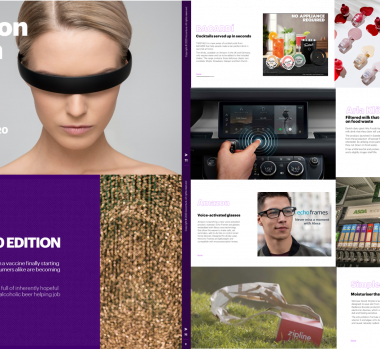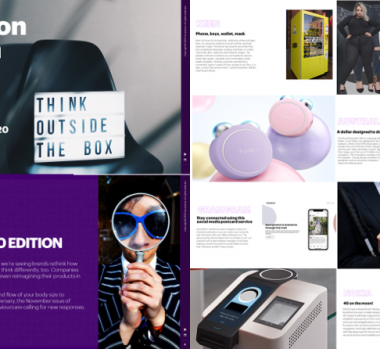Experiment Engines: The Key to Unlocking Disruption
And one that leverages their scale and their people rather than relying on start-up’s and external providers.
Experimentation is the way we can make Big beautiful again but many leaders in companies of scale are unaware of a) how well placed a big company is to Experiment, and b) how Experimentation can be used throughout the innovation process. Some aspects of Experimentation, like using prototypes to drive iterative learning around new solutions are practiced widely. But there are other less well known ways in which Experimentation can drive disruptive offer development:
- Experimentation can step change the audacity and ambition of a leadership team
- Experimentation helps growth strategy get on track by identifying the right problem to be solved
- Experimentation incubates customer value propositions in a market environment. This makes for better business plans and more supportive investors.
When Not To Experiment
First, let’s cover situations where Experimentation is not appropriate:
- Where you know the answer already and are just looking for validation.
- Where it would be dangerous to Experiment. You don’t want to Experiment with air traffic control for instance, at least not while planes are in the air.
- When you are tackling a big and complex transformation programme. You may need the rigour of an Agile process instead.
- When it’s not possible to measure the outcome of an experiment.
A general rule of thumb is that Experiments are a useful tool if you are trying to do anything where the outcome is important and uncertain. We know from bitter experience that leaders frequently fudge this issue. Often they know what the outcome will be and would be better served just making a decision and moving on. We have a tool gloriously called The Assumptionator that forces leaders to plot their challenge against its potential importance and current uncertainty, this flushes out unnecessary Experiments.
A general rule of thumb is that Experiments are a useful tool if you are trying to do anything where the outcome is important and uncertain. We know from bitter experience that leaders frequently fudge this issue.
Three Effective Use Cases
- Asking the Right Strategic Questions
One of the biggest reasons innovation goes bad is because innovators have fallen in love with their solution and not the problem. Love your problem and you will be flexible around solving it. Love your solution and you could end up in a kind of corporate rigor mortis – paralysing the organisation as you address the wrong problem or no problem at all. Experiments help keep us grounded in loving our problems.An automobile manufacturer we worked with wanted to explore richer adjacent markets. Rather than investigate ‘value pools’ we asked them to look at ‘problem pools’ first and focus on the ‘human problem to be solved’. We use this language deliberately. Can we step back from the world of automobiles and map the market from a customer perspective? Can we understand what role mobility plays in our lives? We did this quickly using the senior team’s instinct and intuition and developed a series of competing and colourful hypotheses; ‘My car is idle most of the day, could I rent it like I Airbnb my flat’? Or ‘I own my car like I used to own DVD’s, what does the Netflix of car ownership look like?’ We reworked each hypothesis with customers over three iterations or sprints. At each stage we recalculated the size of the problem we were trying to solve until there was one customer problem that stood out in terms of its incidence (how widely or frequently it is experienced) and its intensity (how significant a problem it is and how effectively it is or isn’t being addressed by current solutions or workarounds). The leadership team, having been through the experience, really got behind the next step which was to chase down a solution. - Ambition and Audacity
We worked with a struggling pharmaceutical company on a topic steeped in ‘unknowns’ and where too much time was spent politely trying to understand each other’s uninformed perspective. As a result the group’s ambition was levelled down in an effort to accommodate everyone’s view. So we asked key players to ‘get punchy’ and articulate their strongest point of view. What is the problem we are trying to solve? Then over a couple of weeks we shared the differing hypotheses with their customers, iterating as we went until a clear and BIG unsolved problem emerged. For the first time, the leadership team were agreed around a significant battle they were going to fight.
- Incubating a New Business Model
As any entrepreneur will tell you, getting a new business successfully to market is a hundred times more difficult than creating a value proposition or concept. There are so many variables that need to work smoothly as a system. We helped a financial services company bring a disruptive new offer to market. We had the customer value proposition nailed down but were uncertain how the complex ecosystems of payments, fulfilment logistics and staff recruitment could work. We made assumptions about each of these critical variables and methodically Experimented with each. Over six weeks we were able to build out the business model in lots of detail and create a powerful ‘pitch pack’ that our clients took successfully to their bosses.
As any entrepreneur will tell you, getting a new business successfully to market is a hundred times more difficult than creating a value proposition or concept.
Experimenters’ User Guide
- Behaviour Beats Process:
Experiments demand people have both a strong point of view but also the humility to admit they were wrong and try another path. Frankly this is exhausting as it calls for continuous vigilance around our behaviour. We often remind people that emotional and physical resilience are key to Experimenting and if it ‘ain’t hurting it ain’t working’. Do not expect an Experiment to be friction free! - Interpretation is All:
Experiments need interpreting, and you can’t do that if you don’t have a good level of empathy for your customers and business operations. Experiments aren’t a panacea in themselves, they need to be driven by people for whom insight is ‘always on’.
Experiments aren’t a panacea in themselves, they need to be driven by people for whom insight is ‘always on’.
- Experiments are Ugly:
Experiments often don’t look good or feel comfortable. Walk into an Experimenter’s office and it’s messy. You will find scrappy looking prototypes, parts not the whole of an offer, rudimentary problem pool sizing maths on a flip chart and people trying hard not to lose it with each other – they know they need to argue with good intent. Likewise, Experiments rarely follow a common form. A series of experiment cycles might involve intensive co-creation hotshops with customers, online registration for a fake product or standing outside in the winter asking passers by what they think of your concept. - Experiments are Common Sense:
The word ‘Experiment’ is easy to grasp and not intimidating to most people. The process is simple: Channel your passion and suggest a problem that needs fixing, or a solution that needs looking at. Devise a series of tests that place your hypotheses in the hands of customers, in as close to a real life environment as you can. Don’t be disheartened if they don’t like what they see, the key thing is what you learnt and how you can act on that in the next cycle or sprint. Experiments are present in many popular management tools (Agile, Lean Start-Up, Design Thinking etc), we believe in making them easy to use hence the deliberate attempt to keep it simple, human and enjoyable. - Not Everything is an Experiment:
I think this could be a good comedy sketch. People fall in love with Experimentation and then everything they do is an ‘Experiment’. Remember an Experiment is a creative discipline requiring an assumption that is validated over several rounds of learning by people who know what they are doing. Simply labelling any activity an Experiment devalues something that should be used deliberately and carefully.
This is the second post in our series on Experiment Engines, read the first here: Experiment Engines: The Key to Unlocking Agility and Growth in the Organisations of Scale
In the next articles we discuss in more depth how this plays out in practice. If you want to talk more about Experimentation call me now on +44 7970 742 553 or get in touch at matt.kingdon@whatifinnovation.com
Get in touch


